unit 1 Grammar
图片预览
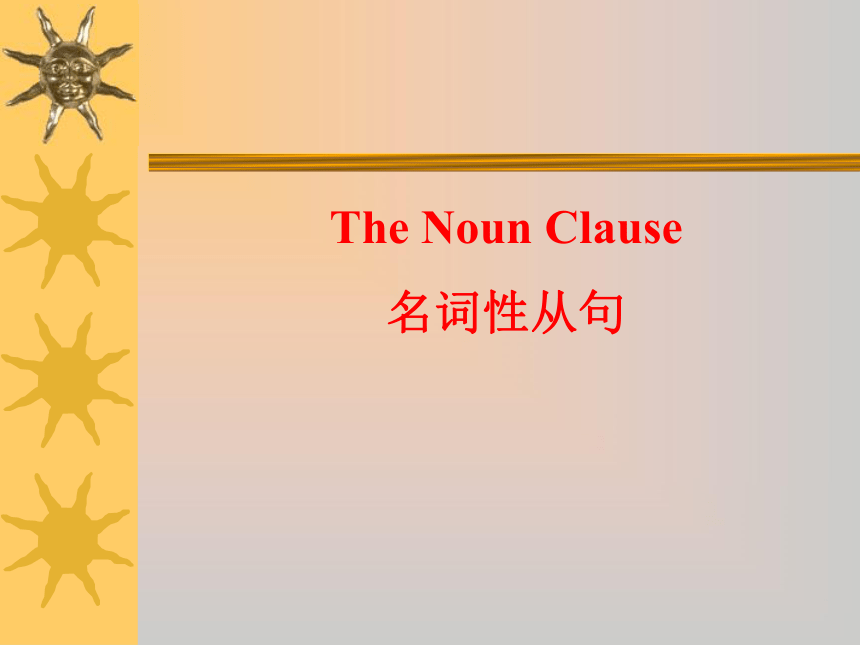
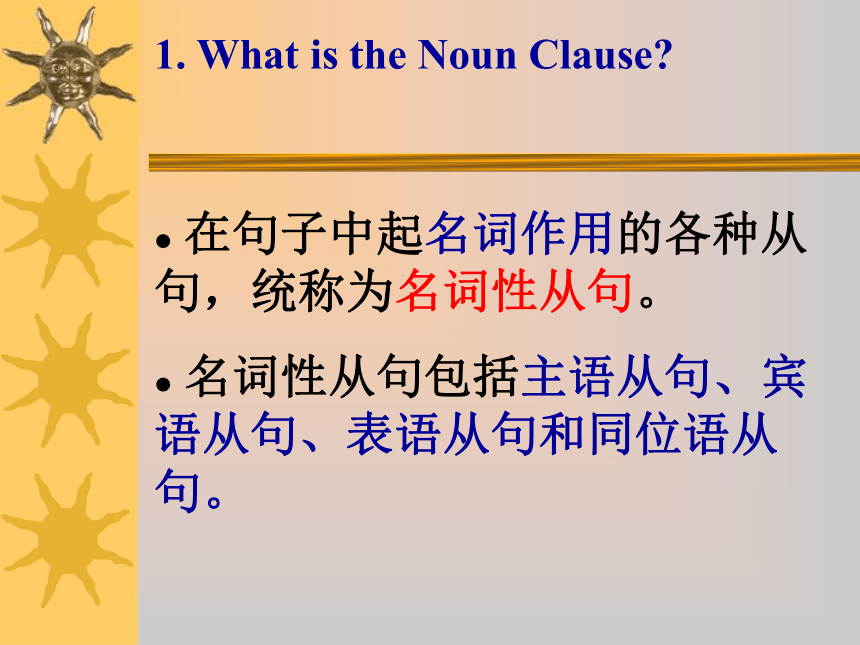

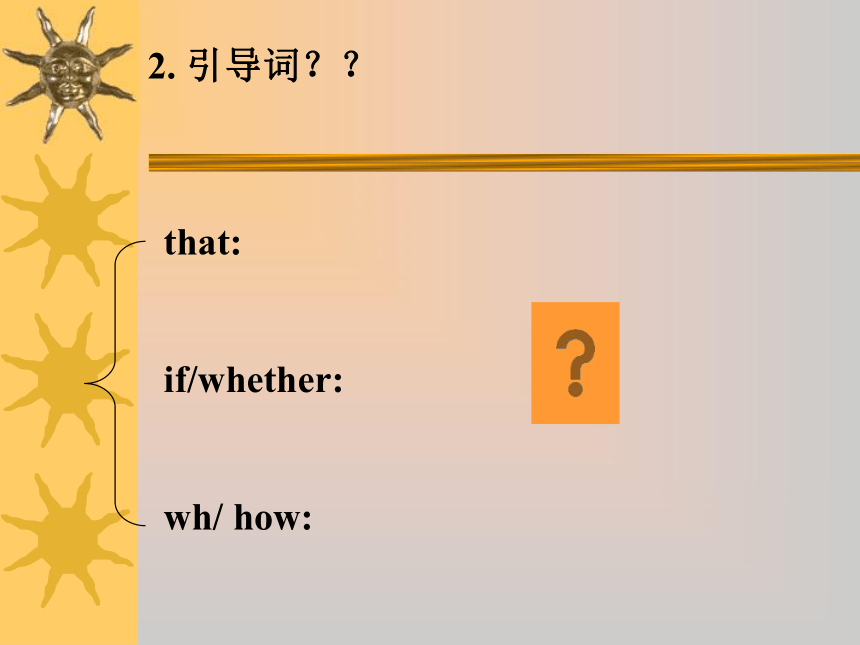

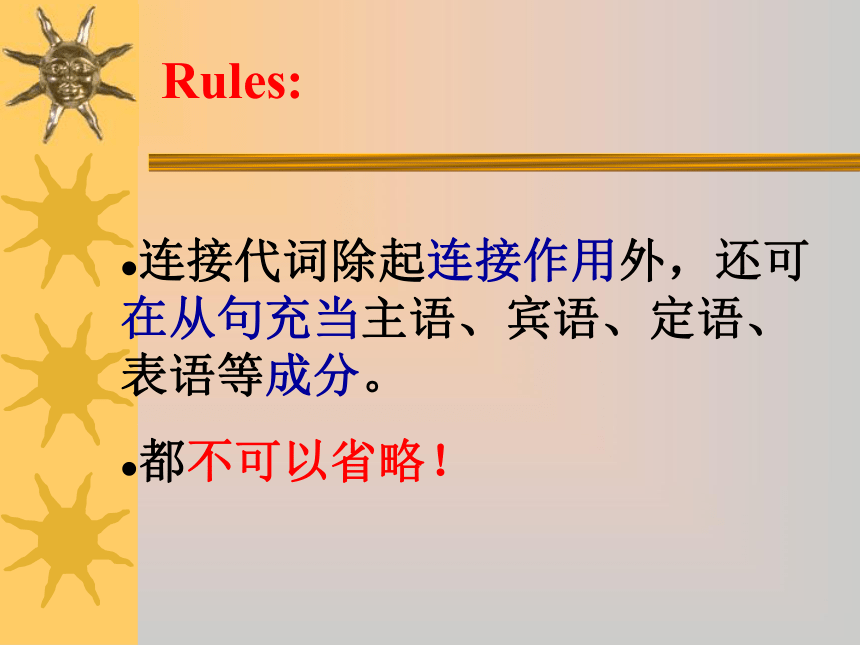
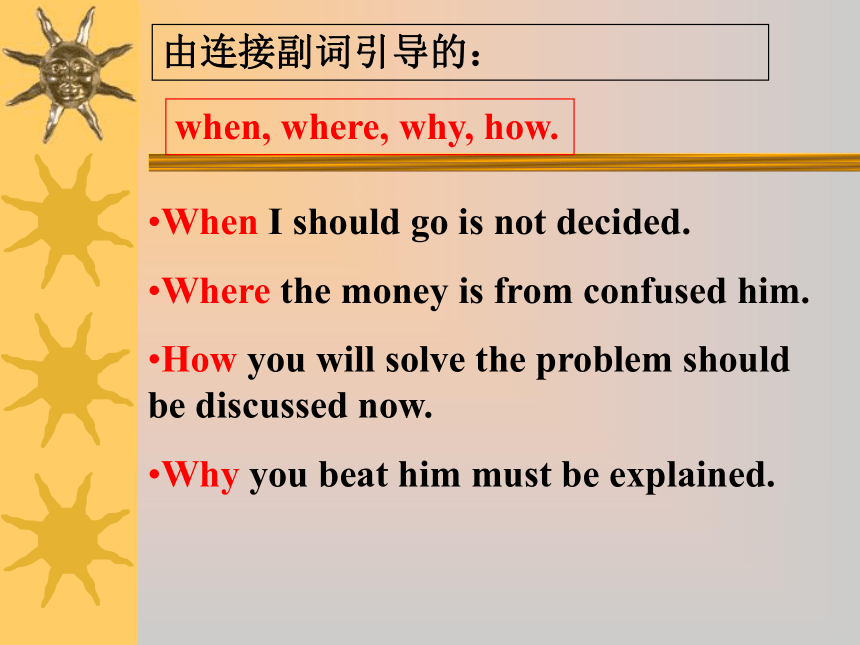

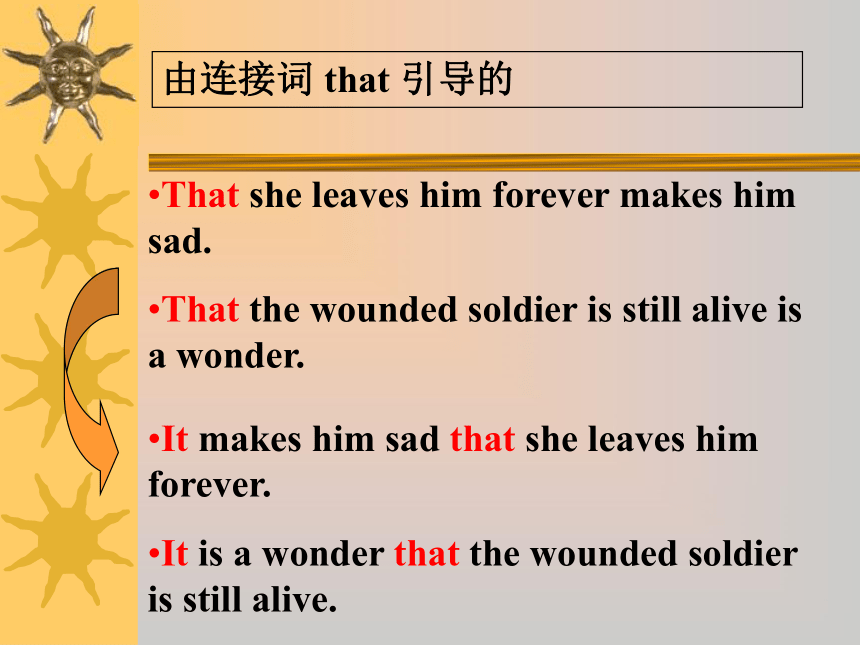
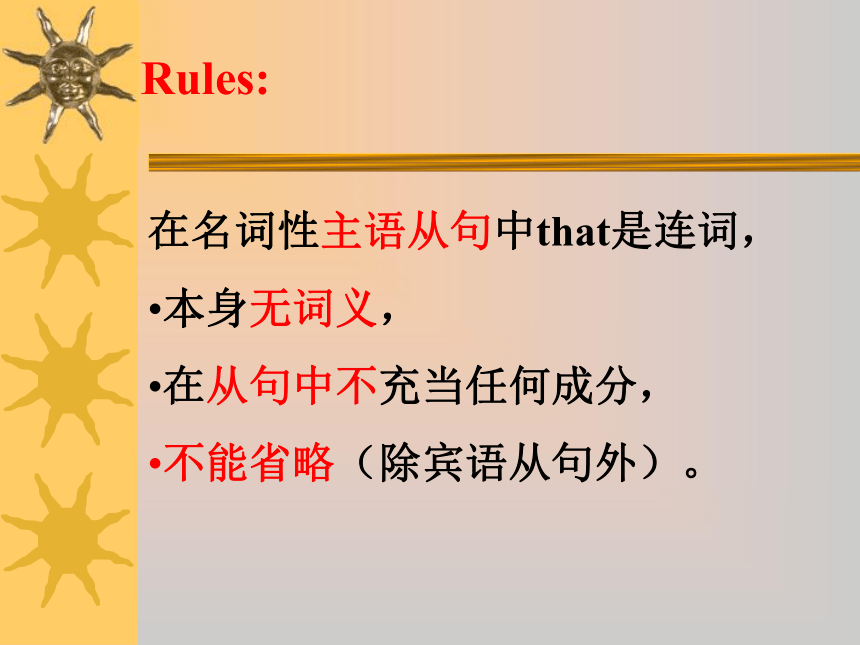
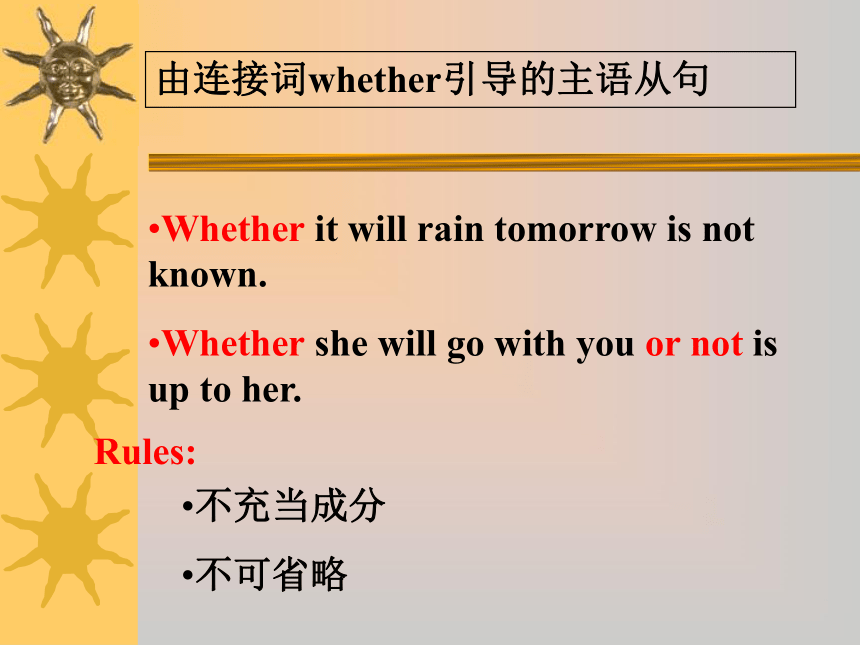

文档简介
课件53张PPT。The Noun Clause
名词性从句 在句子中起名词作用的各种从句,统称为名词性从句。
名词性从句包括主语从句、宾语从句、表语从句和同位语从句。1. What is the Noun Clause?That the earth is round is true.
All of us know that we must study hard.
The question is how we can get there.
The news that John will come encourages everyone here. 主语从句宾语从句表语从句同位语从句4种5. It is true that the earth is round.1种2. 引导词?? that:
if/whether:
wh/ how:
主语从句:在句子中充当主语的功能由连接代词引导的 What you said was true.
Who will go makes no difference.
Whom your daughter loves is clear.
Whose bike was missing made him puzzled.
Which book I should buy is hard to decide.
Whoever breaks the laws should be punished.who, whose, whom, which, what, whoever,
whomever, whichever, whatever连接代词除起连接作用外,还可在从句充当主语、宾语、定语、表语等成分。
都不可以省略! Rules:由连接副词引导的:when, where, why, how.When I should go is not decided.
Where the money is from confused him.
How you will solve the problem should be discussed now.
Why you beat him must be explained.连接副词除起连接作用外,还在从句中充当(时间、地点、方式、原因)状语成分。
都不可以省略!Rules:由连接词 that 引导的That she leaves him forever makes him sad.
That the wounded soldier is still alive is a wonder.It makes him sad that she leaves him forever.
It is a wonder that the wounded soldier is still alive.Rules:在名词性主语从句中that是连词,
本身无词义,
在从句中不充当任何成分,
不能省略(除宾语从句外)。由连接词whether引导的主语从句Whether it will rain tomorrow is not known.
Whether she will go with you or not is up to her.Rules:不充当成分
不可省略Practice:Jack 喜欢Rose是人人都知道的。
我做的事情都是为了你。
问题是我该租哪间房子呢。
任何进入该楼的人都必须出示身份证。
他是否会来我们还不清楚。
你杀人的动机得给我们解释一下。
我们下次见面的时间和地点还没定。名词性从句之二:宾语从句功能:在句子中做动词或者介词的宾语由连接代词(wh) 引导的:The professor asked who can answer the question.
The headmaster wanted to know whom the boy saved.
I don’t know whose side I should take.
I understood what you meant.
You may choose whatever you like in the shop.Rules:充当句子中的成分(主、谓、宾等)
不可以省略由连接副词(when/where/why/how)引导的宾语从句:I don’t know when they got there.
Could you tell me s now?
I’ll let you choose how you’re going to die.
His teacher didn’t understand why this boy had so many strange questions.Rules:充当时间、地点、方式、原因状语
不可以省略由连接词 that 引导的宾语从句:He found that his English was too limited.
They said that the Arab had stolen their horse.
I am afraid that I have failed my test.
We’re sure that we will win the first prize.关于it作形式宾语!I think it impossible that he could finish his work in such a short time.
Rules: 不充当充分 可以省略名词性从句之三:表语从句1. 由连接代词(wh)引导的The question is who will support us.
What I want to say is whom we will support.
China is not what it used to be.
The thing I want to know is whose car was stolen.Rules:充当成分
不可以省略2. 由连接副词引导的表语从句The question is when we can go.
This was where Qianlong lived.
That was how the Chinese first raised silkworms.
That’s why I am going to kill you.rules:充当时间、地点、方式、原因状语
不可以省略3 由连接词that 引导的表语从句My suggestion is that we should leave now.rules:不充当成分
不可以省略4 由连接词whether 引导的表语从句The question is whether she is willing to marry you.名词性从句之四:同位语从句Q 1: What is Appositive Clause?
A: 如果担当同位语成分的是一个句子,则这个句子为同位语从句。
Q 2: 那些词可以引导同位语从句?
A:
连词that
疑问词whether, when, where, how, what, why等examples:
Where did you get the idea that I couldn’t come?
We must face the fact that we have spent all our money.
They had no information whether he was still alive.
I have no idea when he will return.Conclusion:
that 引导的同位语从句, that 在从句中不充当成分,没有词义,不能省略。
疑问词引导的同位语从句,疑问词不能省略。
同位语从句常放在fact, idea, truth, hope, news, thought, discovery等名词的后面,说明该名词的具体内容,对其加以阐明或解释。注 1:同位语从句的位置。
同位语从句一般情况下紧跟在有关的名词后面。然而,有时则不是这样,它被其他的词隔开了,或者说被后置了。
examples:
An idea occurred to him that he might borrow the money from his father.
They heard the news on the radio yesterday that a typhoon was coming.注 2:同位语从句和定语从句的区别:
Compare the following two sentences:
1) The idea that one can do the work without thinking is wrong.
2) The idea that you put forward at the meeting is wrong.同位语从句定语从句
That he will come is certain.
My idea is that we’ll all go.
The idea that we invited him yesterday was quite good.
He said (that) he was feeling ill.
The problem lies in that he doesn’t work hard.
I told him nothing except that you were my friend.
关于连接词thatthat/ (that)1.I don’t think _____ she is coming.
2.It is a pity _____ he has made such a
mistake. 3.The reason is _____ he is careless . 4.The news _____ our team won the match inspired us. 5.I don’t think it necessary ______ you
should read English aloud. 6.He told me ______ his father had died and ______ he had to make a living alone. (that)thatthatthatthat(that)thatTask 5: 比较连接词whether & if
Whether they win is all the same to me.
The question is whether you can do it yourself.
The question whether he should come himself or send another one hasn’t been decided.
I had no idea whether he passed the test.
I don’t know whether/if I can come.
I don’t know whether or not I can come. if / whether 1. I asked her _________ she had a bike. 2.______ we will hold a party in the open air tomorrow depends on the weather. 3. We’re worried about ______ he is safe. 4. I don’t know _________ he is well or not. 5. I don’t know _______ or not he is well. 6. The question is _______ he should do it. 7.The doctor can hardly answer the question ______ the old man will recover soon. 8. I don’t know _______ to go.if / whetherWhetherwhetherwhether/ifwhetherwhetherwhetherwhetherHe said that he like rain very much and that he wouldn’t use an umbrella when it was raining.
No one knows whether it will be fine tomorrow and whether he will come to work.Rules?Practice time1.It now appears ______ they are in need of help.
A. that B. which C. what D. how
2.It is good news ______ they will arrive in a few days.
A. which B. what C. that D. how
3.It ______ Joe drives badly.
A. thought that B. thinks that
C. is thought what D. is thought that
4.It ______ he is late for class.
A. may that B. might that
C. may be that D. might be what
5.This is ______ she was born.
A. where B. which C. that D. what
6.The question is ______ we can’t go there today.
A. that B. what C. which D. when7.The question is ______ it is worth doing.
A. if B. whether C. which D. what
8.The reason why he has made such great progress is _______ he has never wasted his time.
A. because B. why C. that D. what
9.My suggestion is ______ we should turn the land into rice fields.
A. what B. that C. which D. where
10.His proposal is that the dam ______ at the foot of the mountain.
A. build B. will build C. be built D. will be built
11.My advice is that he ______ regular exercise.
A. keep B. would keep C. keeps D. kept
12.______ knows the truth will tell you about it.
A. Who that B. Whoever C. Whom that D. That who13.We all know the truth _____ the earth goes round the sun.
A. that B. which C. what D. whether
14.We heard the news ______ our team had won.
A. which B. that C. what D. where
15.The problem ______ it is right or wrong has not yet been decided.
A. which B. that C. whether D. if
16.You must do well ______ the teacher asks you to do.
A. which B. what C. that D. whereTask 2: 连接代词及其作用:
The question is who can operate the new machine.
They asked whose idea this was.
Which plan is better is clear now.
Do you know what that is?
This is what he has asked for.Task 3: 连接副词及其作用:
How we can raise our production remains a problem.
Tell me why you were absent yesterday.
When the meeting will be held has not been decided yet.
The question is where we shall perform the experiment. Task 6: 有关主语从句:Q 1: What is the Subject Clause?
A: 在句子中担当主语的是一个从句, 这个从句就叫作主语从句。
Q 2: 引导主语从句的词有那些?
A: 1) 连词 that, whether
2) 连接代词 what, who, which, whatever, whoever等
3) 连接副词 when, where, how, why等1. that & whether 引导的主语从句:
That she’s ill is true.
That the driver couldn’t control the car was obvious.
Conclusion: that 引导主语从句时,本身无意义,在从句中不充当任何成分,不能省略。3) Whether he will come is doubtful.
4) Whether he will be invited hasn’t been decided.
Conclusion: whether 引导主语从句,当“是否”讲,在从句中不担当任何成分,不能省略;也不能用if 代替。2. wh-, how 引导的主语从句:
What he did is not yet know.
Who is to look after the old man has not been decided yet.
Why he said that is still unknown.
How they will go there depends on the weather.
Whoever leaves the office should tell me.Conclusion:
连接代词和连接副词引导的主语从句,在从句中充当成分,不能省略。
连接代词和连接副词引导的主语从句和疑问句不同,它的语序是陈述语序。3. it 作 “形式主语”时的主语从句:
1) It was obvious that the driver couldn’t control the car.
2) It remains a question when we shall have our sports meet.
3) It doesn’t matter what she looks like.Task 7: 关于表语从句:
Q 1: What is Predicative Clause?
A: 主句中连系动词后的从句叫表语从句。其结构为:主语+连系动词+表语从句。
Q 2: 常用的系动词有哪些?
A: be, seem, remain, lookexamples:
What they want to know is whether there is enough water left.
The question remains whether we should accept their invitation.
It looks that/as if it is going to rain.Conclusion:
连词 that 无意义,不充当任何成分,一般不省略。
连词as if 在此用来引导表语从句。另外: 也可以通过同位语标志词语that is, such as等词来判断同位语。
Let me know your college address, that is, where you live in term time.
Many questions, such as how the guests should be seated, remained unanswered.Conclusion:
从意义上来说,同位语从句是对一个名词加以补充说明解释,而定语从句是对一个名词进行修饰和限定。
2) 从结构上来说,同位语从句由连接词that引导时,连接词在从句中不充当任何成分;而定语从句由关系词that引导时,关系词在从句中充当主语或宾语,充当宾语时可省略。 Task 9: what 引导名词从句的两种意义:
The teacher asked us what water is composed of.
What we need is a Chinese-English dictionary.what: 疑问意义 “什么”what: “...的东西” “...的事情” (相当于the thing(s) which)Task 10: what 从句和that 从句的比较:
He told me what he had thought.
He told men (that) he had bought a book.what: “...的东西”; what 在句子中有意义,充当成分.that:在句子中无意义, 不充当任何成分; 只是引出一个陈述句. Task 11: who & whoever
Do you know who will do the task?
I will give the book to whoever wants to read it.Conclusion:
who仅可表示疑问意义,而the person who/whom 的意义要用whoever/whomever来表示.it 作形式主语时的主语从句:
注1:
Who will be sent to carry out the task has been settled.
改成一般疑问句:
Has who will be sent to carry out the task been settled?
Has it been settled who will be sent to carry out the task?FT带主语从句的主句是疑问式时,必须用it 作形式主语的结构。Conclusion:
在名词性从句中:whether (or not)可引导所有名词从句;if仅可引导动词后的宾语从句,而且不可后接or not.换句话说: 看到whether 和if 时:
先判断是不是条件状语从句,是条件状语从句,只能用if。
如果不是条件状语从句统统首选whether。注 2:
What he wants is a book.
It is a book what he wants.F在what 引导的主语从句表示“ ...的东西”时,一般不用it 作形式主语。
名词性从句 在句子中起名词作用的各种从句,统称为名词性从句。
名词性从句包括主语从句、宾语从句、表语从句和同位语从句。1. What is the Noun Clause?That the earth is round is true.
All of us know that we must study hard.
The question is how we can get there.
The news that John will come encourages everyone here. 主语从句宾语从句表语从句同位语从句4种5. It is true that the earth is round.1种2. 引导词?? that:
if/whether:
wh/ how:
主语从句:在句子中充当主语的功能由连接代词引导的 What you said was true.
Who will go makes no difference.
Whom your daughter loves is clear.
Whose bike was missing made him puzzled.
Which book I should buy is hard to decide.
Whoever breaks the laws should be punished.who, whose, whom, which, what, whoever,
whomever, whichever, whatever连接代词除起连接作用外,还可在从句充当主语、宾语、定语、表语等成分。
都不可以省略! Rules:由连接副词引导的:when, where, why, how.When I should go is not decided.
Where the money is from confused him.
How you will solve the problem should be discussed now.
Why you beat him must be explained.连接副词除起连接作用外,还在从句中充当(时间、地点、方式、原因)状语成分。
都不可以省略!Rules:由连接词 that 引导的That she leaves him forever makes him sad.
That the wounded soldier is still alive is a wonder.It makes him sad that she leaves him forever.
It is a wonder that the wounded soldier is still alive.Rules:在名词性主语从句中that是连词,
本身无词义,
在从句中不充当任何成分,
不能省略(除宾语从句外)。由连接词whether引导的主语从句Whether it will rain tomorrow is not known.
Whether she will go with you or not is up to her.Rules:不充当成分
不可省略Practice:Jack 喜欢Rose是人人都知道的。
我做的事情都是为了你。
问题是我该租哪间房子呢。
任何进入该楼的人都必须出示身份证。
他是否会来我们还不清楚。
你杀人的动机得给我们解释一下。
我们下次见面的时间和地点还没定。名词性从句之二:宾语从句功能:在句子中做动词或者介词的宾语由连接代词(wh) 引导的:The professor asked who can answer the question.
The headmaster wanted to know whom the boy saved.
I don’t know whose side I should take.
I understood what you meant.
You may choose whatever you like in the shop.Rules:充当句子中的成分(主、谓、宾等)
不可以省略由连接副词(when/where/why/how)引导的宾语从句:I don’t know when they got there.
Could you tell me s now?
I’ll let you choose how you’re going to die.
His teacher didn’t understand why this boy had so many strange questions.Rules:充当时间、地点、方式、原因状语
不可以省略由连接词 that 引导的宾语从句:He found that his English was too limited.
They said that the Arab had stolen their horse.
I am afraid that I have failed my test.
We’re sure that we will win the first prize.关于it作形式宾语!I think it impossible that he could finish his work in such a short time.
Rules: 不充当充分 可以省略名词性从句之三:表语从句1. 由连接代词(wh)引导的The question is who will support us.
What I want to say is whom we will support.
China is not what it used to be.
The thing I want to know is whose car was stolen.Rules:充当成分
不可以省略2. 由连接副词引导的表语从句The question is when we can go.
This was where Qianlong lived.
That was how the Chinese first raised silkworms.
That’s why I am going to kill you.rules:充当时间、地点、方式、原因状语
不可以省略3 由连接词that 引导的表语从句My suggestion is that we should leave now.rules:不充当成分
不可以省略4 由连接词whether 引导的表语从句The question is whether she is willing to marry you.名词性从句之四:同位语从句Q 1: What is Appositive Clause?
A: 如果担当同位语成分的是一个句子,则这个句子为同位语从句。
Q 2: 那些词可以引导同位语从句?
A:
连词that
疑问词whether, when, where, how, what, why等examples:
Where did you get the idea that I couldn’t come?
We must face the fact that we have spent all our money.
They had no information whether he was still alive.
I have no idea when he will return.Conclusion:
that 引导的同位语从句, that 在从句中不充当成分,没有词义,不能省略。
疑问词引导的同位语从句,疑问词不能省略。
同位语从句常放在fact, idea, truth, hope, news, thought, discovery等名词的后面,说明该名词的具体内容,对其加以阐明或解释。注 1:同位语从句的位置。
同位语从句一般情况下紧跟在有关的名词后面。然而,有时则不是这样,它被其他的词隔开了,或者说被后置了。
examples:
An idea occurred to him that he might borrow the money from his father.
They heard the news on the radio yesterday that a typhoon was coming.注 2:同位语从句和定语从句的区别:
Compare the following two sentences:
1) The idea that one can do the work without thinking is wrong.
2) The idea that you put forward at the meeting is wrong.同位语从句定语从句
That he will come is certain.
My idea is that we’ll all go.
The idea that we invited him yesterday was quite good.
He said (that) he was feeling ill.
The problem lies in that he doesn’t work hard.
I told him nothing except that you were my friend.
关于连接词thatthat/ (that)1.I don’t think _____ she is coming.
2.It is a pity _____ he has made such a
mistake. 3.The reason is _____ he is careless . 4.The news _____ our team won the match inspired us. 5.I don’t think it necessary ______ you
should read English aloud. 6.He told me ______ his father had died and ______ he had to make a living alone. (that)thatthatthatthat(that)thatTask 5: 比较连接词whether & if
Whether they win is all the same to me.
The question is whether you can do it yourself.
The question whether he should come himself or send another one hasn’t been decided.
I had no idea whether he passed the test.
I don’t know whether/if I can come.
I don’t know whether or not I can come. if / whether 1. I asked her _________ she had a bike. 2.______ we will hold a party in the open air tomorrow depends on the weather. 3. We’re worried about ______ he is safe. 4. I don’t know _________ he is well or not. 5. I don’t know _______ or not he is well. 6. The question is _______ he should do it. 7.The doctor can hardly answer the question ______ the old man will recover soon. 8. I don’t know _______ to go.if / whetherWhetherwhetherwhether/ifwhetherwhetherwhetherwhetherHe said that he like rain very much and that he wouldn’t use an umbrella when it was raining.
No one knows whether it will be fine tomorrow and whether he will come to work.Rules?Practice time1.It now appears ______ they are in need of help.
A. that B. which C. what D. how
2.It is good news ______ they will arrive in a few days.
A. which B. what C. that D. how
3.It ______ Joe drives badly.
A. thought that B. thinks that
C. is thought what D. is thought that
4.It ______ he is late for class.
A. may that B. might that
C. may be that D. might be what
5.This is ______ she was born.
A. where B. which C. that D. what
6.The question is ______ we can’t go there today.
A. that B. what C. which D. when7.The question is ______ it is worth doing.
A. if B. whether C. which D. what
8.The reason why he has made such great progress is _______ he has never wasted his time.
A. because B. why C. that D. what
9.My suggestion is ______ we should turn the land into rice fields.
A. what B. that C. which D. where
10.His proposal is that the dam ______ at the foot of the mountain.
A. build B. will build C. be built D. will be built
11.My advice is that he ______ regular exercise.
A. keep B. would keep C. keeps D. kept
12.______ knows the truth will tell you about it.
A. Who that B. Whoever C. Whom that D. That who13.We all know the truth _____ the earth goes round the sun.
A. that B. which C. what D. whether
14.We heard the news ______ our team had won.
A. which B. that C. what D. where
15.The problem ______ it is right or wrong has not yet been decided.
A. which B. that C. whether D. if
16.You must do well ______ the teacher asks you to do.
A. which B. what C. that D. whereTask 2: 连接代词及其作用:
The question is who can operate the new machine.
They asked whose idea this was.
Which plan is better is clear now.
Do you know what that is?
This is what he has asked for.Task 3: 连接副词及其作用:
How we can raise our production remains a problem.
Tell me why you were absent yesterday.
When the meeting will be held has not been decided yet.
The question is where we shall perform the experiment. Task 6: 有关主语从句:Q 1: What is the Subject Clause?
A: 在句子中担当主语的是一个从句, 这个从句就叫作主语从句。
Q 2: 引导主语从句的词有那些?
A: 1) 连词 that, whether
2) 连接代词 what, who, which, whatever, whoever等
3) 连接副词 when, where, how, why等1. that & whether 引导的主语从句:
That she’s ill is true.
That the driver couldn’t control the car was obvious.
Conclusion: that 引导主语从句时,本身无意义,在从句中不充当任何成分,不能省略。3) Whether he will come is doubtful.
4) Whether he will be invited hasn’t been decided.
Conclusion: whether 引导主语从句,当“是否”讲,在从句中不担当任何成分,不能省略;也不能用if 代替。2. wh-, how 引导的主语从句:
What he did is not yet know.
Who is to look after the old man has not been decided yet.
Why he said that is still unknown.
How they will go there depends on the weather.
Whoever leaves the office should tell me.Conclusion:
连接代词和连接副词引导的主语从句,在从句中充当成分,不能省略。
连接代词和连接副词引导的主语从句和疑问句不同,它的语序是陈述语序。3. it 作 “形式主语”时的主语从句:
1) It was obvious that the driver couldn’t control the car.
2) It remains a question when we shall have our sports meet.
3) It doesn’t matter what she looks like.Task 7: 关于表语从句:
Q 1: What is Predicative Clause?
A: 主句中连系动词后的从句叫表语从句。其结构为:主语+连系动词+表语从句。
Q 2: 常用的系动词有哪些?
A: be, seem, remain, lookexamples:
What they want to know is whether there is enough water left.
The question remains whether we should accept their invitation.
It looks that/as if it is going to rain.Conclusion:
连词 that 无意义,不充当任何成分,一般不省略。
连词as if 在此用来引导表语从句。另外: 也可以通过同位语标志词语that is, such as等词来判断同位语。
Let me know your college address, that is, where you live in term time.
Many questions, such as how the guests should be seated, remained unanswered.Conclusion:
从意义上来说,同位语从句是对一个名词加以补充说明解释,而定语从句是对一个名词进行修饰和限定。
2) 从结构上来说,同位语从句由连接词that引导时,连接词在从句中不充当任何成分;而定语从句由关系词that引导时,关系词在从句中充当主语或宾语,充当宾语时可省略。 Task 9: what 引导名词从句的两种意义:
The teacher asked us what water is composed of.
What we need is a Chinese-English dictionary.what: 疑问意义 “什么”what: “...的东西” “...的事情” (相当于the thing(s) which)Task 10: what 从句和that 从句的比较:
He told me what he had thought.
He told men (that) he had bought a book.what: “...的东西”; what 在句子中有意义,充当成分.that:在句子中无意义, 不充当任何成分; 只是引出一个陈述句. Task 11: who & whoever
Do you know who will do the task?
I will give the book to whoever wants to read it.Conclusion:
who仅可表示疑问意义,而the person who/whom 的意义要用whoever/whomever来表示.it 作形式主语时的主语从句:
注1:
Who will be sent to carry out the task has been settled.
改成一般疑问句:
Has who will be sent to carry out the task been settled?
Has it been settled who will be sent to carry out the task?FT带主语从句的主句是疑问式时,必须用it 作形式主语的结构。Conclusion:
在名词性从句中:whether (or not)可引导所有名词从句;if仅可引导动词后的宾语从句,而且不可后接or not.换句话说: 看到whether 和if 时:
先判断是不是条件状语从句,是条件状语从句,只能用if。
如果不是条件状语从句统统首选whether。注 2:
What he wants is a book.
It is a book what he wants.F在what 引导的主语从句表示“ ...的东西”时,一般不用it 作形式主语。
